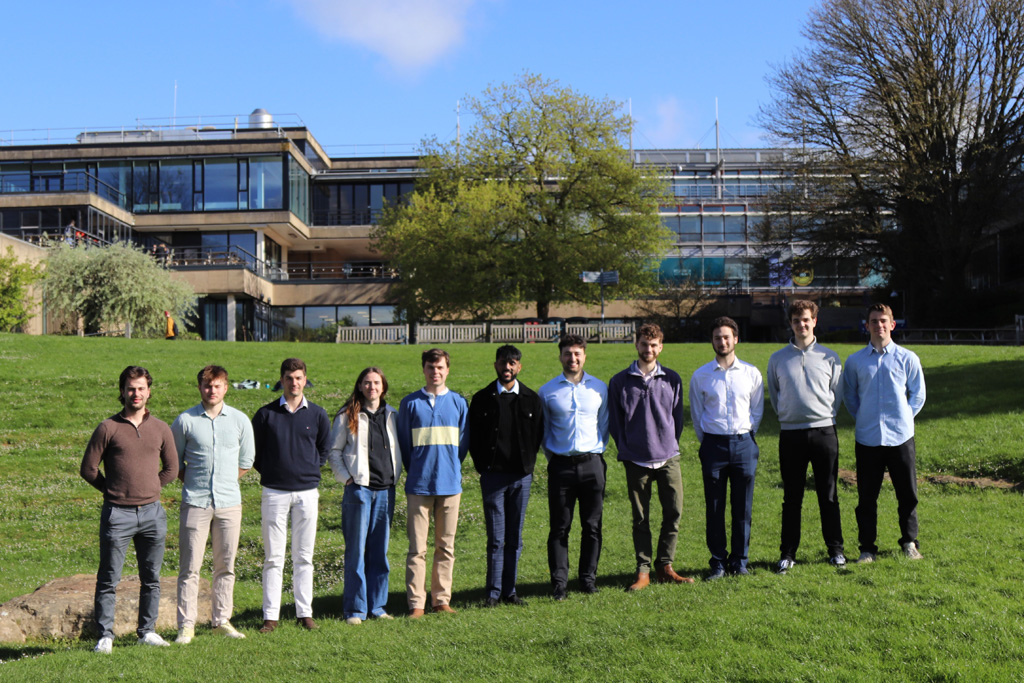
A team of engineering students at the University of Bath have achieved a world first by becoming the first undergraduates to build and successfully run a hydrogen-fuelled engine. Members of the Bath Hydrogen team, who are aiming to set a land speed record, switched on their prototype engine in March, when it ran at the first attempt.
The achievement makes them the world’s first undergraduate students to develop and run a hydrogen-powered internal combustion engine (or H2ICE). Their work is marked out by the fact that no hydrogen-powered internal combustion engine is currently commercially available, although major automotive manufacturers are developing the technology.
‘Starting the engine for the first time was a nerve-wracking moment, so we were delighted when it ran at the first attempt. It was a great validation of all our hard work,’ said Bath Hydrogen technical lead Nicholas Burt, who is studying for an MEng in mechanical engineering. ‘We are using a test bed now before moving on to adapting the engine we’ll make the record attempt in, and we’ve learned so much about how to redesign and engineer that through this process. The support we’ve had from our early sponsors and from around the university has been invaluable.’
The project started last year as a group business design project, a part of the team members’ studies. At the outset, none of them had prior knowledge of hydrogen fuel or what was required to make the engine a reality.
‘We started by reading all of the research and literature we could find, analysing and cataloguing it all to understand it and prioritise what was possible for us to pull off, as a fairly small team,’ said Bath Hydrogen team leader Samuel Ray, who is studying for an MEng in mechanical automotive engineering. ‘We are lucky to have received help and equipment from our sponsors, as hydrogen-fuelled engines work very differently to normal petrol ones and require different parts that are not commercially available. We worked hard alongside Link Engine Management to program their ECU [electronic control unit] to work with hydrogen, for example.’

Bath Hydrogen chose to focus on creating a hydrogen-powered race car in light of the molecule being a potentially zero-carbon fuel, as well as the upcoming ban on sales of new petrol and diesel cars from 2035, and because of the university’s significant research expertise in using hydrogen as a fuel and energy storage medium.
The Bath Hydrogen engine is a modified version of a single-cylinder petrol engine, donated by Vanguard, a sponsor of the team. The unit was selected as a test bed due to its relative simplicity, potential for adaptation and the generous support of the company.
The team re-engineered the engine with help from sponsors Link Engine Management, which provided a specialist ECU, and Clean Air Power, which provided the engine’s new hydrogen-specific fuel injectors.
The test engine has helped the team refine its techniques and capabilities before setting to work in the next academic year on adapting a 2.3-litre Ford Ecoboost engine to use hydrogen fuel, using learnings gleaned from developing the current engine prototype. The Ford unit will be installed in a Ginetta G20 racing car, which will be used to attempt various land speed class records for a hydrogen-fuelled internal combustion engine.
Hydrogen has many advantages over petrol as a fuel – the main one being no CO2 production at the point of use – but it also presents many challenges. Hydrogen has a very high energy density per unit mass, but a very low energy density per unit volume, making it difficult to store sufficient fuel in the vehicle. The solutions to this are to either store hydrogen as a compressed gas at very high pressure, or a liquid at around –250°C, both of which present significant difficulties compared to petrol.
The 15-strong Bath Hydrogen team is made up of third- and fourth-year students from courses including mechanical engineering, automotive engineering, integrated mechanical and electrical engineering. The team was formed as a follow-on to Team Bath Racing, one of the UK’s most successful Formula Student racing teams, which was wound up in 2022 following the decision to focus on zero-emission vehicles instead of continuing to develop petrol-engine racing cars.
‘Many of us believe that the internal combustion engine still has an important role to play in moving towards net-zero, using hydrogen and synthetic fuels in certain niche areas,’ said the team’s academic supervisor, Kevin Robinson. ‘Getting the prototype engine running has been a very significant milestone in this project. It’s still early days but we have completed about 30 minutes of continuous operation so far, including several minutes at full load. All the systems put in place are working well and are producing valuable data. There is a lot of work still to do but this has been a very promising start.’



